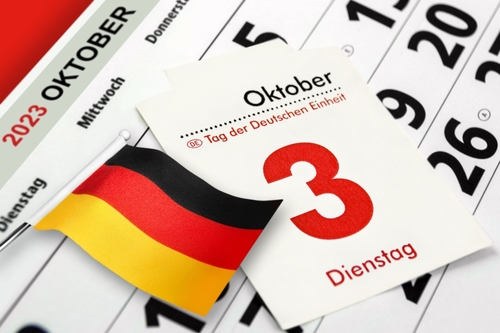Every year on October 3rd, Germany celebrates one of its most important national holidays: German Unity Day, or Tag der Deutschen Einheit. This day marks the reunification of Germany in 1990, a moment that reshaped the country and ended decades of division.
If you’re living abroad, connecting with loved ones in Germany during this celebration is a meaningful way to share in the national pride. This guide explains the history behind German Unity Day and how it’s celebrated today.
The Story Behind German Unity Day
To understand the importance of this day, it’s helpful to look back at the events that led to it. After World War II, Germany was divided into four zones, each occupied by one of the Allied powers: the United States, the United Kingdom, France, and the Soviet Union.
This division created two separate states in 1949:
- The Federal Republic of Germany (West Germany): A democratic state aligned with Western Europe and the U.S.
- The German Democratic Republic (East Germany): A communist state under the influence of the Soviet Union.
For over 40 years, these two states developed separately. A physical and ideological barrier, the Berlin Wall, cut through the heart of Berlin, symbolizing the “Iron Curtain” that divided Europe. Families were split apart, and life on either side was vastly different.
The path to reunification began in 1989. Peaceful protests across East Germany, known as the Monday Demonstrations, put immense pressure on the government. On November 9, 1989, in a surprising turn of events, East German officials announced that citizens were free to cross the border. That night, crowds gathered at the Berlin Wall, and people from both sides began to tear it down, creating one of the most iconic images of the 20th century.
This historic event set in motion a series of political negotiations. Less than a year later, on October 3, 1990, the German Democratic Republic officially joined the Federal Republic of Germany, making the nation whole again. October 3rd was chosen as the official public holiday to commemorate this reunification.
How Is German Unity Day Celebrated?
German Unity Day is a public holiday across all 16 German states. This means schools, banks, and most businesses are closed, giving people a day off to rest and celebrate. Unlike other national holidays in some countries, German Unity Day is typically observed with solemnity and reflection rather than large military parades.
The official celebrations are hosted by a different major city each year. These celebrations usually include:
- Speeches from political leaders, including the German Chancellor and President.
- A citizen’s festival (Bürgerfest) with food stalls, live music, and cultural exhibitions that showcase the diversity of Germany’s regions.
- Open-air concerts featuring both local and national artists.
- Fireworks to cap off the day’s events.
Throughout the country, you’ll see the German flag displayed on public buildings. Many people use the day to spend time with family and friends, enjoy the autumn weather, or attend local events.
For Germans living abroad, it’s a day to remember their heritage and connect with family back home.
Frequently Asked Questions (FAQs)
Why is German Unity Day on October 3rd?
October 3rd, 1990, is the date when the German Democratic Republic (East Germany) was formally dissolved and its states joined the Federal Republic of Germany (West Germany), officially reuniting the country.
Is German Unity Day the same as Germany’s National Day?
Yes, German Unity Day is the national day of Germany. It is the country’s only federal public holiday, meaning it is observed nationwide.
What is the symbol of German Unity Day?
The Brandenburg Gate in Berlin is the most powerful symbol of German reunification. Once a symbol of division located right next to the Berlin Wall, it now represents peace and a unified Germany.
How Does German Unity Day Compare to Golden Week in China?
German Unity Day and Golden Week in China are both vital celebrations in their respective nations. While German Unity Day marks the reunification of East and West Germany, understanding golden week china reveals a time of travel and family gatherings, highlighting cultural differences in commemorating national identity and heritage.
Celebrating with Loved Ones
German Unity Day is a time for reflection, celebration, and connection. It honors a pivotal moment in the nation’s history and celebrates the peace and freedom that followed.
If you have family or friends in Germany, this is a perfect time to reach out and share in the day’s significance. Sending money to support your loved ones is simple and secure with a trusted service.
